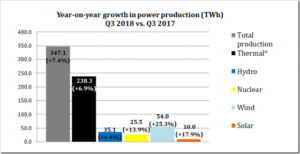by GWPF & Climate Home News, October 31, 2018
While Brazil has elected a climate sceptical president, Germany’s ‘climate chancellor’ Angela Merkel has announced that she is gradually stepping down from her political roles. Green news outlets are voicing concern that these and other developments in the Western world are putting the Paris agreement and the entire climate agenda at risk of falling apart.
…
by P. Homewood, October 31, 2018 in NotaLotofPeopleKnowThat
China’s power statistics have now been published for Q3, and continue to show thermal generation rising quickly. (Thermal includes coal, gas and biomass).
The rise in thermal generation since last year is more than from all other sources put together.
Biomass is virtually irrelevant in the overall view of things, having only accounted for 1.2% of generation last year.
Once again, we see that China’s unstoppable demand for energy cannot be supplied from wind and solar alone. Indeed. these two sources have only contributed 18% of the extra year-on-year demand.
In overall terms, wind and solar have only supplied 4.6% and 1.3% respectively of China’s generation so far this year.
…
by Renee Hannon, October 29, 2018 in WUWT
Introduction
This post is a coarse screening assessment of HadCRUT4 global temperature anomalies to determine the impact, if any, of data quality and data coverage. There has been much discussion on WUWT about the quality of the Hadley temperature anomaly dataset since McLean’s Audit of the HadCRUT4Global Temperature publication which is paywalled. I purchased a copy to see what all the hub-bub was about, and it is well worth the $8 in my view. Anthony Watts’ review of McLean’s findings and executive summary can be found here.
A key chart for critical study is McLean’s Figure 4.11 in his report. McLean suggests that HadCRUT4 data prior to 1950 is unreliable due to inadequate global coverage and high month-to-month temperature variability. For this post, I subdivided McLean’s findings into three groups shown with added shading: Good data which covers the years post-1950. During this period global data coverage is excellent at greater than 75% and month-to-month temperature variation is low. Questionable data occurs from 1880 to 1950. During this period global data coverage ranged from 40% to 70% with higher monthly temperature variations. Poor data is pre-1880 when global coverage ranged from 14 to 25% with extreme monthly temperature variations.
by Claire Stam, October 29, 2018 in Euractiv
Only sixteen countries out of the 197 that have signed the Paris Agreement have defined national climate action plan ambitious enough to meet their pledges, according to a policy brief released on Monday (29 October), ahead of the crucial UN climate conference COP24 in Katowice (Poland) in December.
The 16 countries are: Algeria, Canada, Costa Rica, Ethiopia, Guatemala, Indonesia, Japan, FYR Macedonia, Malaysia, Montenegro, Norway, Papua New Guinea, Peru, Samoa, Singapore and Tonga.
…
by J. Delingpole, October 30, 2018 in ClimateChangeDispatch
Another global warming scare story bites the dust: fragile islands and atolls in the Pacific are not sinking beneath the waves because of global warming. In fact, they are doing just fine.
The bad news (only bad for alarmists, of course) comes in a study by Virginie Duvat of the University of La Rochelle-CNRS, France, titled ‘A global assessment of atoll island planform changes over the past decades’.
It surveyed 30 Pacific and Indian Ocean atolls, including 709 islands, and found that 90 percent have either remained stable or have grown in the last few decades.

…
by David Middleton, October 30, 2018 in WUWT
The Cretaceous Period was “3-10°C hotter than preindustrial levels” for TENS OF MILLIONS OF YEARS! Even if the models were right, 3 °C of warming over 100 years is not comparable to tens of millions of years of 3-10 °C hotter average global surface temperatures.
The Cretaceous Period was much warmer than the Miocene Epoch.
La géologie, une science plus que passionnante … et diverse


